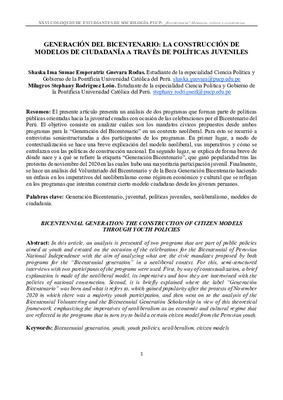| dc.contributor.author | Guevara Rodas, Shaska Ima Sumac Emperatriz | |
| dc.contributor.author | Rodríguez León, Milagros Stephany | |
| dc.date.accessioned | 2022-07-12T15:19:05Z | |
| dc.date.available | 2022-07-12T15:19:05Z | |
| dc.date.issued | 2021 | |
| dc.identifier.uri | https://repositorio.pucp.edu.pe/index/handle/123456789/185632 | |
| dc.description.abstract | El presente artículo presenta un análisis de dos programas que forman parte de políticas
públicas orientadas hacia la juventud creadas con ocasión de las celebraciones por el Bicentenario del
Perú. El objetivo consiste en analizar cuáles son los mandatos cívicos propuestos desde ambos
programas para la “Generación del Bicentenario” en un contexto neoliberal. Para esto se recurrió a
entrevistas semiestructuradas a dos participantes de los programas. En primer lugar, a modo de
contextualización se hace una breve explicación del modelo neoliberal, sus imperativos y cómo se
entrelazan con las políticas de construcción nacional. En segundo lugar, se explica de forma breve de
dónde nace y a qué se refiere la etiqueta “Generación Bicentenario”, que ganó popularidad tras las
protestas de noviembre del 2020 en las cuales hubo una mayoritaria participación juvenil. Finalmente,
se hace un análisis del Voluntariado del Bicentenario y de la Beca Generación Bicentenario haciendo
un énfasis en los imperativos del neoliberalismo como régimen económico y cultural que se reflejan
en los programas que intentan construir cierto modelo ciudadano desde los jóvenes peruanos. | es_ES |
| dc.description.abstract | In this article, an analysis is presented of two programs that are part of public policies
aimed at youth and created on the occasion of the celebrations for the Bicentennial of Peruvian
National Independence with the aim of analyzing what are the civic mandates proposed by both
programs for the “Bicentennial generation” in a neoliberal context. For this, semi-structured
interviews with two participants of the programs were used. First, by way of contextualization, a brief
explanation is made of the neoliberal model, its imperatives and how they are intertwined with the
policies of national construction. Second, it is briefly explained where the label “Generación
Bicentenario” was born and what it refers to, which gained popularity after the protests of November
2020 in which there was a majority youth participation, and then went on to the analysis of the
Bicentennial Volunteering and the Bicentennial Generation Scholarship in view of this theoretical
framework, emphasizing the imperatives of neoliberalism as an economic and cultural regime that
are reflected in the programs that in turn try to build a certain citizen model from the Peruvian youth. | es_ES |
| dc.language.iso | spa | es_ES |
| dc.publisher | Pontificia Universidad Católica del Perú | es_ES |
| dc.rights | info:eu-repo/semantics/openAccess | es_ES |
| dc.rights.uri | http://creativecommons.org/licenses/by-nc-nd/2.5/pe/ | * |
| dc.subject | Generación Bicentenario | es_ES |
| dc.subject | Políticas juveniles | es_ES |
| dc.subject | Neoliberalismo | es_ES |
| dc.subject | Modelos de ciudadanía | es_ES |
| dc.title | Generación del bicentenario: la construcción de modelos de ciudadanía a través de políticas juveniles | es_ES |
| dc.type | info:eu-repo/semantics/conferenceObject | es_ES |
| dc.subject.ocde | https://purl.org/pe-repo/ocde/ford#5.04.01 | es_ES |
| dc.publisher.country | PE | es_ES |


